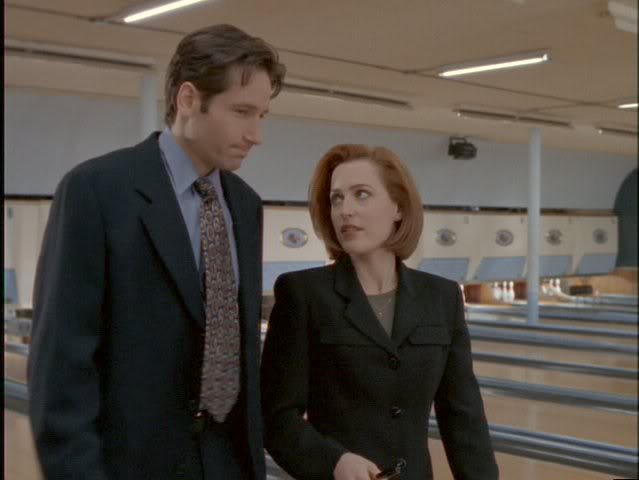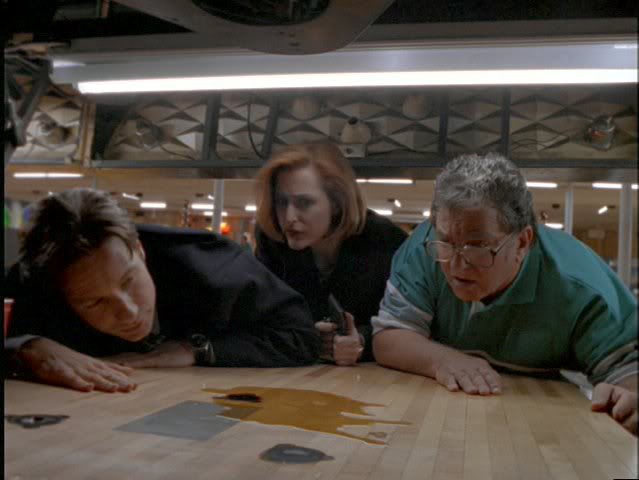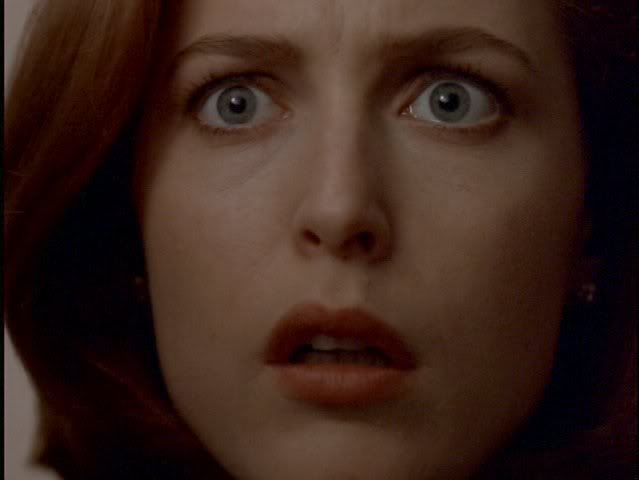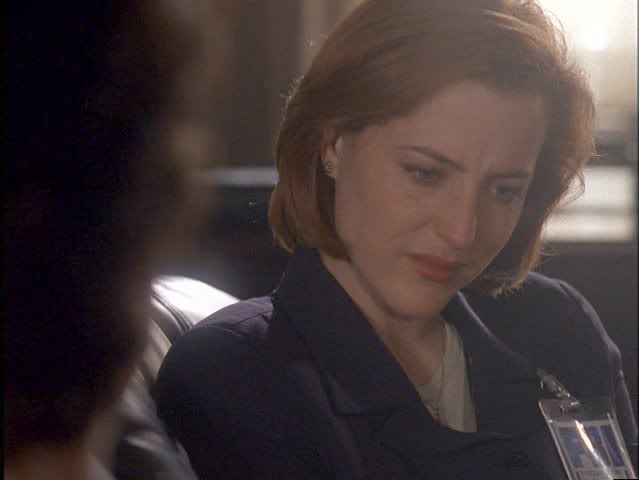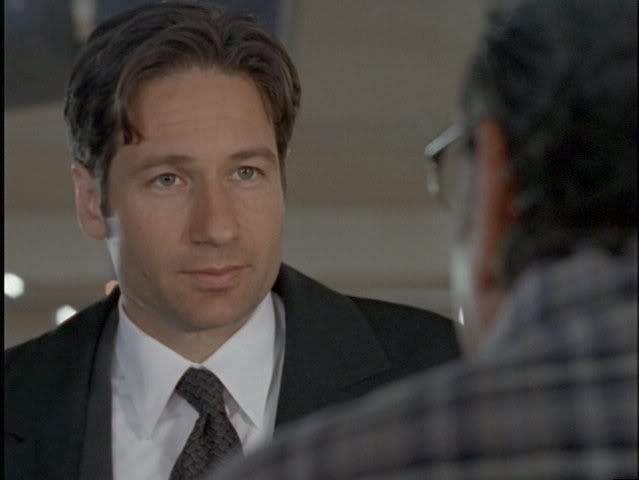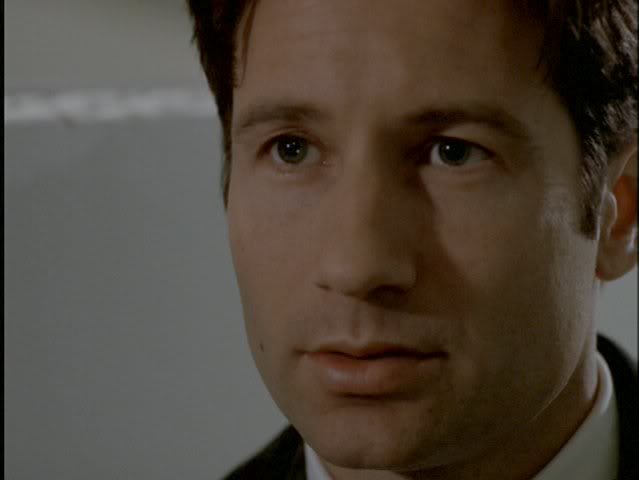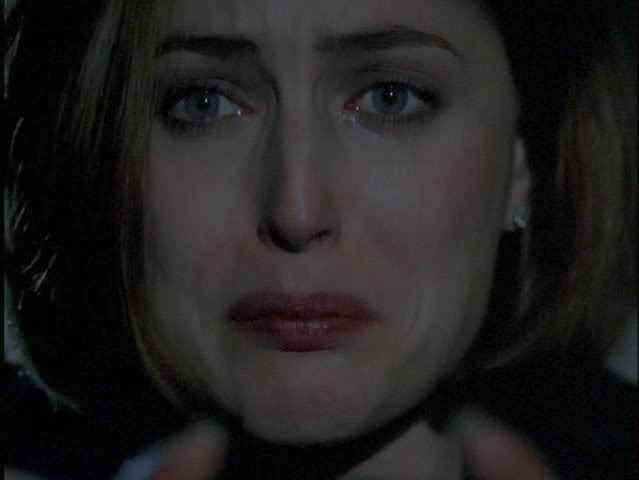CTP Episode of the Day - 08.25.06
Today's Cherished Episode: Elegy (4x22)
Original Air Date: May 4, 1997
Written By: John Shiban
Directed By: Jim CharlestonSeveral young women have been murdered on Mulder and Scully's home turf. Their prime suspect is a mentally disabled man, Harold Spuller, who has been beset by a series of frightening apparitions.
M: "You can believe what you want to believe, Scully, but you can't hide the truth from me because if you do, then you're working against me ... and yourself. I know what you're afraid of. I'm afraid of the same thing."
S: "The doctor said I was fine."
M: "I hope that's the truth."Some "Elegy" Tidbits & Musings:
-- "Haunted Bowling Alley." That was all that was written on the index card that clung tenaciously to story editor John Shiban's bulletin board for an entire year. "It just seemed right, somehow," said Shiban of his cryptic story idea. It blossomed into a full-blown story line only after the filming of "Memento Mori," the episode in which Scully's battle with cancer is established.
-- "My wife reminded me of something we'd seen happen ten years earlier," said Shiban. "Her father, Jerry Tanner, was dying of lung cancer. Janet and I weren't married yet, but we were going together, and we went to visit him in his hospital room. This was near the end, and he was very sick. Jerry kept looking away from us, then at Janet, and then he said, 'How many people are in the room?' My wife said, 'There's just me and John.' And he looked over to the other side of the room, then looked back to us, and finally just said, 'Okay'."
-- Shiban added, "That incident -- and the idea that a dying person might be able to look through the cracks, so to speak, into the next world -- really stuck in my mind. So just before Christmas break, when Chris asked me what I was going to do next, I told him that I had this idea about an apparition that only the dying can see. And when he heard that he said, 'Yes. That's a perfect idea for Scully'."
-- This episode apparently went through quite a few transformations and several titles before the version we got on screen. One title was "Tulpa," which means a ghostly manifestation of a "thought-form" produced by the mind in Tibetan mystic practice. Another title was "Revenant," which means one that comes back following an absence or one who returns after death. (Gee, that would have made a good Season 8 episode title! < g >)
-- The final title, "Elegy," is a poem expressing grief for someone who is dead.
-- The episode's obvious fascination with the retro-tech world of bowling and mechanical pinspotting can be traced back to John R. Shiban, the writer's father. Mr. Shiban had worked in a bowling alley as a young man and had regaled his son with tales of that experience. The part of "Angie's Midnight Bowl" was played by the Thunderbird Bowling Center, a venerable North Vancouver fun spot staked out by locations manager Louisa Gradnitzer and rented for several days of filming. Cast and crew were under strict instructions to preserve the bowling surfaces; all those who arrived too late to grab an empty pair of bowling shoes were required to shuffle along with paper booties on their feet.
-- The other main story element -- the mentally disabled and institutionalized character Harold Spuller -- was inspired by Shiban's love for the 1975 movie One Flew Over the Cuckoo's Nest. In fact, Chuck Forsch, Harold's friend and roommate, was played by Sydney Lassick, the actor who portrayed Jack Nicholson's "challenged" sidekick Cheswick in the movie. Lassick passed away in 2003. Not at all coincidentally, Chuck Forsch was also the name of Chris Carter's L.A.-based assistant.
-- Steven M. Porter, the experienced (and totally nondisabled) character actor who played Harold Spuller, was invited to audition for The X-Files by an old college friend from UCLA, Frank Spotnitz. A member of the well-known Actor's Gang theater troupe, he had previously played a part similar to Spuller in one of the troupe's productions, an original play called Asylum.
-- Porter remembered pulling out all the stops when he read for Chris Carter. "After I left the room I thought, I've either made a great impression or a complete fool of myself." Many of the gestures and tics Porter used in the episode were products of his research, in several mental hospitals and adult group homes, for Asylum. In fact, he said, a certain flapping-hand movement became so vital to his portrayal of Harold that he kept doing it even when looping some dialogue in the recording studio after filming had wrapped.
-- Jim Charleston who directed this episode also directed "Avatar," "Teliko," and "Synchrony."
-- Nitpick: The scene of the written scorecards on the wall was very creepy, but the bowling alley had automatic scoring screens, so there would have been no need to keep score on paper.
-- Oopsie! In the scene where Harold recites the bowling scores, the scores for Fred Graham are 17 42 67 88 107 122 131 166 178 201. No wonder the guy bowled a 200 game since his score jumped from 131 to 166; in bowling, you can't score more than 30 pins in one frame.
-- Despite all the splits and spares, Gillian Anderson remembered "Elegy" as being a particularly challenging -- and emotionally draining -- episode. "There were some very good, very real transactions between Mulder and Scully," said Anderson.
-- For David Duchovny, "Elegy" was memorable for a different reason. "I realized how old I am," he deadpanned. "The day after we did the bowling scenes, I was sore. And when you get sore from bowling, it's time to start thinking about your life and where it's going."
-- In truth, Duchovny bowled several "friendly" games with the episode's director Jim Charleston between camera set-ups. A few months after the episode was filmed, while being interviewed for the Season 4 Episode Guide, Charleston still had the games with Duchovny on his mind. "Tell him that he still owes me $80," Charleston said; to which Duchovny replied, "That's $80 Canadian. I owe him a lot less than he thinks."
-- Duchovny's impressive bowling prowess also proved to me what a great actor he is; he made bad bowling believable in Return to Me. < g >
-- This was the second time Scully asked for counseling related to her job; the first time was with the same therapist, Karen Kosseff, in "Irresistible." Christine Willes played Kosseff in both "Irrisistible" and "Elegy," as well as in "The Calusari." Willes appears in the new Nicholas Cage film, The Wicker Man.
-- One of the victims Mulder asks Harold about is a woman named Risa Shapiro, which is the name of David Duchovny's agent.
-- Dr. Martin Alpert is named for John Shiban's physician.
-- Once & Future Retreads: In addition to Christine Willes, Alex Bruhanski (Angelo Pintero) played Dr. Bugger in "War of the Coprophages." Lorena Gale, who played Harold's lawyer, played Ellen Bledsoe in "Shadows" and Nurse Wilkins in "One Breath." Michael Puttonen (Martin Alpert) was the Motel Manager in "Deep Throat," Dr. Pilsson in "Sleepless," and the Conductor in "731." Ken Tremblett (Uniformed Officer) was Dyer in "Darkness Falls." Three actors in uncredited roles were also once and future retreads: Gerry Nairn played Sgt. Conner and also appeared in "Red Museum"; Carolyn Tweedle played one of the day room patients and was also Jane Froelich in "Chinga"; and Kate Braidwood also played one of the day room patients and appeared as the Usherette in "The Pine Bluff Variant." Braidwood is the daughter of Tom Braidwood, first assistant director as well as Melvin Frohike.
-- I can't watch "Elegy" without thinking of the bloopers. What would you have done had you called your favorite bowling alley and gotten David Duchovny on the line? You'd still be scraping me off the floor. After all, "I'm just a human being." < g >
-- Mulder and Scully's final scene together is just terrific, as they struggle to tell each other how they feel without really telling each other how they feel. We don't get to see Mulder fall apart, but I believe he does, in private. Scully isn't so lucky, as we see her slowly break down, alone in her car. Then she sees the apparition of Harold in her rear-view, and she can't deny it any more. She's *not* fine, as she insisted numerous times in this episode. Realization hits as Scully and the viewers are suddenly forced to face the issue of her mortality; yes, it certainly looked like Scully was going to die. How were TPTB possibly going to get her out of this predicament? We had to keep tuning in to find out.
(Thanks to chrisnu for today's episode pics.)
Please share your first impressions, favorite (or cringe-worthy) moments, classic lines, favorite fanfic, nagging questions, repeated viewing observations, etc., as today we celebrate "Elegy"!
Polly
